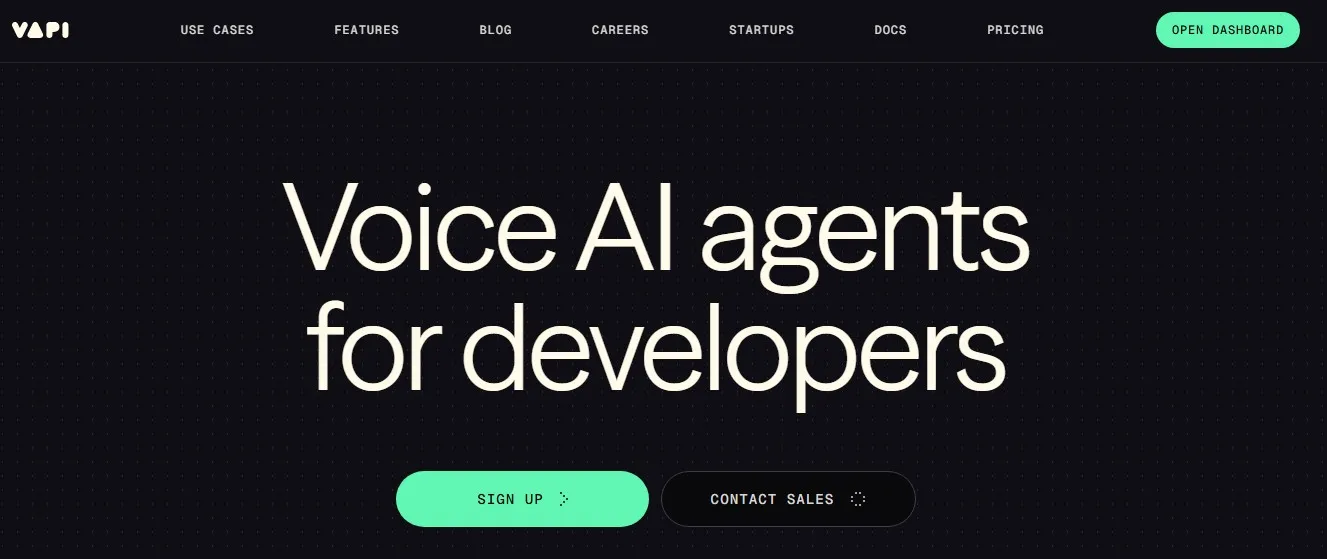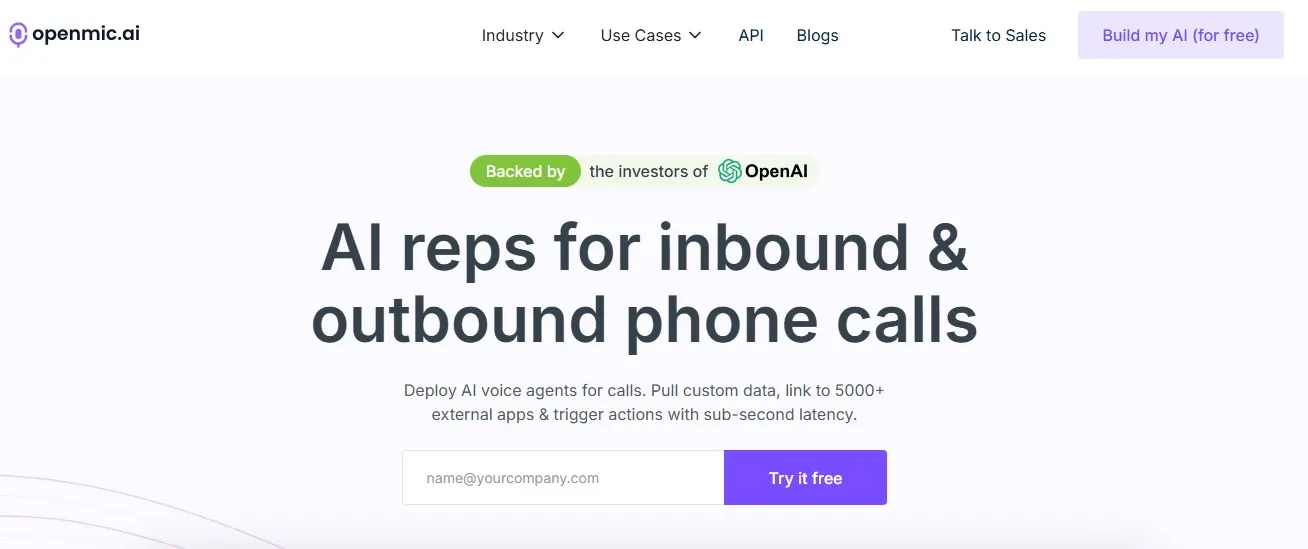.webp)
Vapi AI: Pricing, Features & Alternatives In 2025
Voice AI is no longer a futuristic concept—it's becoming an everyday tool for businesses of all sizes. From automating support calls to qualifying leads and managing customer relationships, AI voice agents are fundamentally transforming the way we work. Among the frontrunners in this evolution is Vapi AI, a developer-centric platform that’s gaining traction in the voice automation space.
But is Vapi the right fit for your business? How does it stack up against emerging alternatives like OpenMic, Synthflow, and Smith.ai? This comprehensive guide breaks down Vapi’s pricing, standout features, and the top competitors you should consider—so you can choose the best solution for your voice automation needs. Whether you're scaling support operations or building interactive product experiences, this article will equip you with the insights needed to choose wisely. For further exploration, see Top 5 Synthflow AI Alternatives in 2025.
What Is Vapi AI?
Vapi AI is a cloud-based voice automation platform built for developers who want to embed natural voice interactions into their apps and services. It provides flexible APIs and tools to build, test, and deploy AI-powered voicebots that respond quickly and accurately. Whether you're in real estate, healthcare, logistics, or e-commerce, Vapi helps automate voice interactions such as appointment scheduling, lead qualification, and customer support follow-ups with minimal latency.
Its emphasis on ultra-low latency and dev-friendly infrastructure makes it a favorite among engineers working on real-time communication workflows. Vapi is particularly useful when you need precise control over dialogue flows and want to experiment with conversational logic in production-grade environments. Learn more in VAPI vs Retell AI: Which AI Voice Agent is Best.

Key Features of Vapi
- Sub-251ms Response Time: Ensures near real-time, human-like conversational experiences for callers, which is critical for natural, uninterrupted communication.
- Customizable Voicebots: Developers can design voice agents tailored to specific workflows or industries, with full control over call routing, logic, and tone.
- Multi-Platform API Support: Easily integrate with apps across web, iOS, Android, and backend systems using REST APIs and SDKs.
- Scalable Infrastructure: Built to handle thousands of concurrent calls with reliable uptime, monitoring, and load balancing to ensure enterprise readiness.
Vapi AI Pricing
Vapi advertises pricing starting at $0.05 per minute. However, additional costs are typically incurred depending on the services used, such as transcription, text-to-speech (TTS), automatic speech recognition (ASR), and integrations with tools like Twilio. Businesses should budget for these hidden charges when evaluating Vapi for long-term or high-volume use. Source
Vapi AI Is Not for Everyone—Here’s Why
While Vapi is a powerful platform for engineers and developers, it may not be suitable for all businesses:
- Non-Technical Teams: Vapi requires programming knowledge, making it less accessible for marketing or operations teams without technical support.
- Out-of-the-Box Use Cases: It lacks pre-configured voice flows, industry-specific templates, or UI dashboards, increasing time-to-launch.
- Scaling Startups: Usage-based pricing can spike quickly, especially with longer calls or higher concurrency, impacting budgeting.
For businesses looking for instant deployment, integrated analytics, and plug-and-play features, other tools may be better suited.
Top Vapi AI Alternatives
1. OpenMic -The Industry Pioneer

OpenMic is a no-code voice AI platform built for speed, scale, and simplicity. It enables businesses to launch intelligent voice agents that can handle real-time customer calls, support requests, and outbound sales—without writing a single line of code.
- Features:
- AI Voice Agents: Built for both inbound and outbound use cases, from cold calls to appointment confirmations.
- CRM Integration: Connects with over 5,000 apps including HubSpot, Salesforce, and Zapier.
- Real-Time Insights: Provides dashboards with transcripts, call logs, voicemail drops, and performance metrics.
- Workflow Automation: Use AI to schedule follow-ups, log notes into CRMs, and trigger email or SMS sequences.
- Pricing: OpenMic offers transparent pricing starting from $0.01/minute. Free trials and tiered usage plans available.
For use cases across verticals, explore How AI Voice Agents Are Helping Restaurants Elevate the Dining Experience or AI-Powered Phone Services for Small Businesses.
2. Synthflow
Synthflow is a highly adaptable no-code platform designed for businesses that need customizable AI voice workflows. It offers flexibility across business sizes—from small companies to white-label agency users.
- Features:
- Visual Workflow Builder: Design complex voice flows without writing code.
- Multi-tier Call Handling: Supports up to 200+ concurrent calls on enterprise plans.
- White Labeling: Great for resellers and B2B partners needing a customizable experience.
- Subaccounts & Workflow Limits: Plans come with support for thousands of workflows and multiple subaccounts.
- Pricing:
- Pro: $375/month for 2,000 mins ($0.13/min after)
- Growth: $750/month for 4,000 mins ($0.12/min after)
- Agency: $1,250/month for 6,000 mins ($0.12/min after)
- Enterprise: Custom pricing with volume rates as low as $0.08/min
3. Bland AI
Bland AI specializes in delivering ultra-human-like voice conversations and is ideal for businesses where tone and delivery matter—such as luxury sales or customer retention roles.
- Features:
- Voice Cloning & Emotional Tuning: Agents sound personalized and adapt tonally to the situation.
- Compliance Tooling: GDPR, CCPA-ready and call consent workflows.
- Complex Dialogue Support: Built for long, dynamic multi-turn conversations.
- Pricing: Custom quote only, with enterprise-focused tiers. Reach out via Bland.ai for tailored pricing.
4. Retell AI
Retell AI is a developer-first voice AI infrastructure platform focused on building high-performance, real-time conversational agents.
- Features:
- Real-Time Latency Optimization: Call interruptions and natural turn-taking are supported.
- Extensive API and SDKs: Great for teams needing deep customization and voice-first apps.
- LLM Integration: Combine AI models like GPT-4o into voice pipelines with ease.
- Pricing:
- ElevenLabs voices: $0.07/min
- PlayHT/OpenAI voices: $0.08/min
- GPT-4o processing: $0.05/min
- Includes: 60 free minutes, 20 concurrent calls, and 10 knowledge bases
5. Smith.ai
Smith.ai blends AI with real human receptionists, delivering a hybrid model ideal for legal, financial, and client-first industries.
- Features:
- 24/7 Receptionist Teams: Calls answered by trained professionals backed by AI.
- Lead Qualification: Smart screening, CRM integration, appointment setting.
- Call Handling Rules: Set custom routing logic and multilingual support.
- Pricing:
- Starter: $292.50/month for 30 calls; $11.00/call overage
- Basic: $787.50/month for 90 calls; $10.00/call overage
- Pro: $2,025/month for 300 calls; $8.00/call overage
- Enterprise: Custom pricing for high-volume usage
The Future of Voice AI in Business
Voice AI is no longer just a tech experiment—it’s becoming central to how companies scale communication. According to a report by Statista, the number of voice assistants worldwide is projected to reach 8.4 billion units by 2024—more than the global population. (Source)
What does this mean for businesses?
- Contact centers will be run by AI agents managing 80%+ of routine queries.
- B2B sales teams will use AI to qualify leads, leave voicemails, and update CRMs.
- Industries like healthcare, insurance, and logistics will lean on voice AI to handle documentation, reminders, and patient/member coordination.
Explore Conversational AI in Banking or AI for Sales Teams: 7 Ways to Drive Revenue to understand its broader impact.
Conclusion: Why OpenMic Leads the Pack
While Vapi AI is excellent for engineers needing deep control, OpenMic is the smarter choice for most growing teams. Its no-code interface, real-time analytics, prebuilt integrations, and transparent pricing make it a game-changer.
If you're ready to bring voice AI into your customer journey without spending weeks in dev time, book a demo with OpenMic and see the difference firsthand. Your next voice agent could be live in minutes—not months.
Explore related blogs
.png)
Voice AI for Mass Tort Lawyers: How Conversational AI Is Revolutionizing Case Intake & Client Engagement
.png)
Top 5 AI Answering Services for Law Firms in 2025 (24/7 Reception & Intake)
.png)
Top 5 White-Label Voice AI Platforms in 2025 (Best for Agencies & SaaS Providers)
Let AI Handle Your Phones So You Can Focus on Growth
Start your free trial and see how OpenMic’s AI voice agents can streamline calls, boost conversions, and deliver fast, 24/7 customer service — without hiring more staff.






.svg)